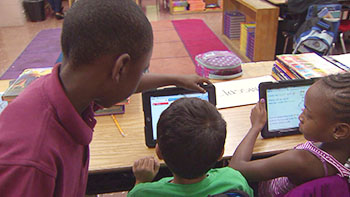Los Angeles School Board Delays iPad Program Roll Out
 LOS ANGELES — Plans to equip 650,000 Los Angeles Unified School District students, teachers and principals with iPads, is now delayed. The Los Angeles County School Board continues to disagree on issues such as contracts, web security and curriculum, and has voted to temporarily scale back the iPad initiative.
LOS ANGELES — Plans to equip 650,000 Los Angeles Unified School District students, teachers and principals with iPads, is now delayed. The Los Angeles County School Board continues to disagree on issues such as contracts, web security and curriculum, and has voted to temporarily scale back the iPad initiative.
According to Superintendent John Deasy, providing iPads, which are intended for standardized test taking, assignments, educational games and media work, will help even the playing field between high- and low-income students. However, roughly 300 students across 47 schools selected to test-drive the program were able to hack security firewalls and access social media and other sites. The breach caused school officials at three schools to reclaim the tablets, while the remaining schools revoked students’ ability to take the iPads off campus.
During a Nov. 12 meeting, board members continued the debate on the usefulness of the initiative, and how it would best be implemented. After nearly three hours, the board voted 6-1 to provide an additional 35 schools with the tablets, on top of those schools already serving as guinea pigs. The decision also included hiring an evaluation team to monitor the effectiveness of the program, and swapping iPads for laptops at seven LAUSD schools to determine which is more useful for students.
In response to the technology debate, board member Monica Garcia said, “If it doesn’t work, we will fix it. If scores go down, we will fix it…but we need courage. I haven’t heard anything scarier than keeping our graduation rate and proficiency rates at the same place.”
Meanwhile, board member Monica Ratliff remains unconvinced that the district has chosen the most effective device. Ratliff cited student reports saying laptops were easier for completing writing assignments. “My intent is to make sure our students have the best devices and the best curriculum as we move forward,” she said.
The school district has negotiated a contract with Apple and Pearson, an online curriculum developer, putting the per tablet price at $768, which also includes software, a protective case and a warranty. The project is expected to cost roughly $1 billion when fully implemented, and includes Wi-Fi upgrades, increased electricity bills, maintenance and licensing. The department will also receive discounts at various price points. However, school board member Steve Zimmer is still concerned about the large price tag. “I don’t feel like we have the best contract,” said Zimmer. “I’ve done everything I can to get my head to a place where I feel comfortable with the contract, but I’m not.”
Long-term funding for the project and devices, which have a three-year guarantee, also remain in question. The one-time sale of school construction bonds to be repaid over 25 years is intended to fund the project. Any leftover monies could be devoted to purchasing more devices, according to Chief Strategy Officer Matt Hill. However, Hill cautioned that bonds would only cover a quarter of future maintenance and repair costs. He added that funds could also be raised through voter-approved bonds, or pulled from the general fund.
Deasy initially aimed for full board approval by December 2013, and complete iPad integration by 2015, bringing the program to the district’s 450 remaining schools. However, he admitted at the Nov. 12 meeting that this date could be pushed back as a result of lingering board concerns.
